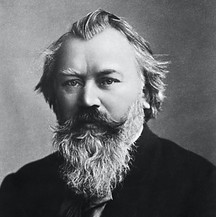Program III: Reflections
Thursday, August 18, 2022 | 7:30 PM
Hannaford Hall, USM | Portland
A gentle serenity and sublime slowness infuses a single-movement nocturne by Schubert and Leonard Cohen's powerful Hallelujah; creating an eloquent setting for Schoenberg’s theatrical “stand against tyranny” for piano, reciter, and string quartet. Ode to Napoleon, based on a poem by Lord Byron, references “La Marseillaise” (France’s national anthem) and Beethoven’s Fifth Symphony to yield a forcefully dramatic expression of resistance in the World War II era. The evening comes to a glorious close with the absolutely gorgeous clarinet quintet by Brahms, one of his final works, written during an unexpected re-emergence from retirement inspired by hearing the virtuoso clarinetist, Richard Mühlfeld.
Franz Schubert Notturno in E-flat Major for Piano Trio, Op. 148 (1827)*
Anthony Marwood, violin; Raman Ramakrishnan, cello; Shai Wosner, piano
Arnold Schoenberg Ode to Napoleon, Op. 41 (1942)
Anthony Marwood, Ayano Ninomiya, violins; Melissa Reardon, viola; Clancy Newman, cello; Shai Wosner, piano; Walter van Dyk, narrator
Leonard Cohen (arr. by Clancy Newman) Hallelujah (1984)
Clancy Newman, Raman Ramakrishnan, Brant Taylor, cellos
~Pause~
Johannes Brahms Clarinet Quintet in B Minor, Op. 115 (1891)
I. Allegro
II. Adagio
III. Andantino
IV. Con moto
Alexander Fiterstein, clarinet; Ayano Ninomiya, Tien-Hsin Cindy Wu, violins; Melissa Reardon, viola; Brant Taylor, cello
* Part of PCMF’s season-wide celebration of Schubert in the 225th anniversary of his birth year.
~Attending Live? Please note that until further notice, properly fitted masks must be worn by all patrons at all times during the concert. On the day of the performance, if you are feeling unwell, please stay at home. We will gladly exchange your tickets for another show. Concert run time is 90 minutes including a brief pause.
~Listening Online? The concerts will be live streamed for free on our YouTube channel. The archived streams will be available to view for 24 hours.
Meet The Artists

Alexander Fiterstein
clarinet

Anthony Marwood
violin
%20web%20size.jpeg)
Clancy Newman
cello, arranger
%20unauth.jpeg)
Ayano Ninomiya
violin

Raman Ramakrishnan
cello
.jpeg)
Melissa Reardon
viola
.jpeg)
Brant Taylor
cello

Walter van Dyk
narrator

Shai Wosner
piano

Tien-Hsin Cindy Wu
violin
Meet The Composers
Arnold Schoenberg
1874-1951
Arnold Schoenberg was an Austrian-American composer, music theorist, teacher, writer, and painter. He is widely considered one of the most influential composers of the 20th century. In the 1920s, Schoenberg developed the twelve-tone technique, an influential compositional method of manipulating an ordered series of all twelve notes in the chromatic scale.
The Ode to Napoleon for Reciter, String Quartet, and Piano was composed during the Second World War as a protest against tyranny. Lord Byron’s poem reprimanding Napoleon served the composer in expressing his own feelings concerning latter-day tyrants.
Franz Schubert
1797-1828
Franz Schubert was an Austrian composer of the late Classical and early Romantic eras. Despite his short lifetime, he left behind a vast catalog, including more than 600 secular vocal works (mainly lieder), seven complete symphonies, sacred music, operas, incidental music, and a large body of piano and chamber music.
One of the treasures hidden in the stacks of unpublished and unfinished music that Schubert left behind is the so-called “Nocturne” in E-flat, a single movement for piano trio that the composer simply titled “adagio,” but to which a later publisher attached the more Romantic, trendy nickname. Completed in the autumn of 1827, the Notturno is possibly a rejected slow movement of the Piano Trio No. 1
Johannes Brahms
1833-1897
Johannes Brahms was a German composer, pianist, and conductor of the mid-Romantic period. Born in Hamburg, he composed for symphony orchestra, chamber ensembles, piano, organ, voice, and chorus. Also a virtuoso pianist, Brahms premiered many of his own works. He worked with leading performers of his time, including the pianist Clara Schumann and the violinist Joseph Joachim (the three were close friends).
Brahms had retired from composing prior to hearing virtuoso clarinetist Richard Mühlfeld play, and was so inspired by what he heard that he came out of retirement to write the Clarinet Quintet in B Minor for Mühlfeld during the summer of 1891.
Leonard Cohen
1934-2016
Leonard Cohen was a Canadian singer-songwriter, poet and novelist. He was inducted into the Canadian Music Hall of Fame, the Canadian Songwriters Hall of Fame, and the Rock and Roll Hall of Fame. Cohen pursued a career as a poet and novelist during the 1950s and early 1960s, and did not begin a music career until 1967 at the age of 33.
Achieving little initial success, "Hallelujah" found greater popular acclaim through a recording by John Cale, which inspired a recording by Jeff Buckley. Following its increased popularity after being featured in the film Shrek (2001), many other arrangements have been performed in recordings and in concert, with over 300 versions known. The song has been used in film and television soundtracks and televised talent contests.







